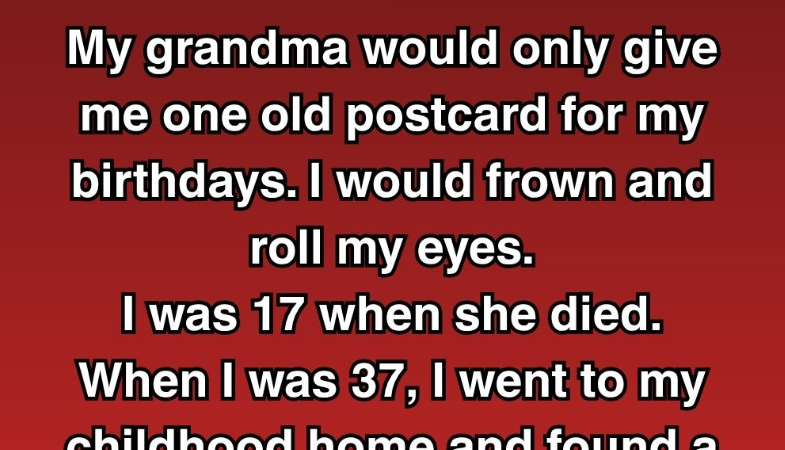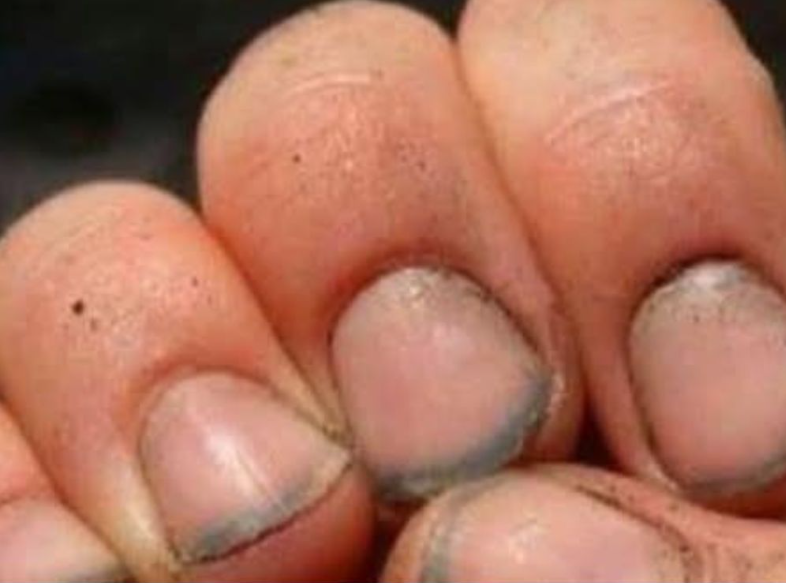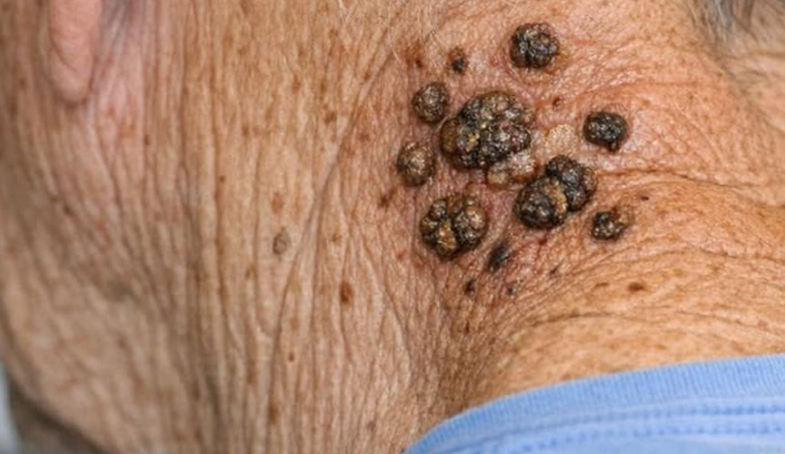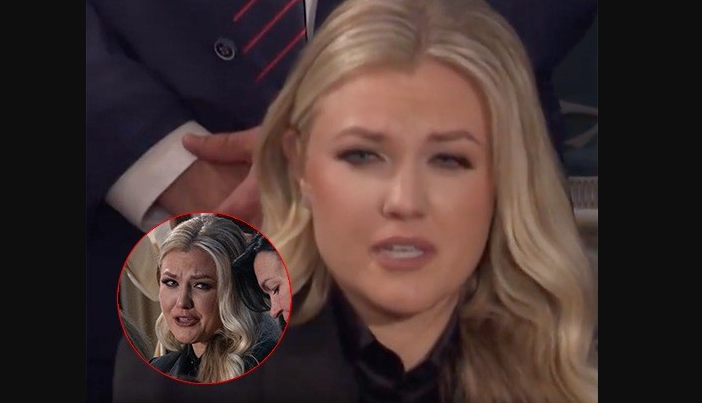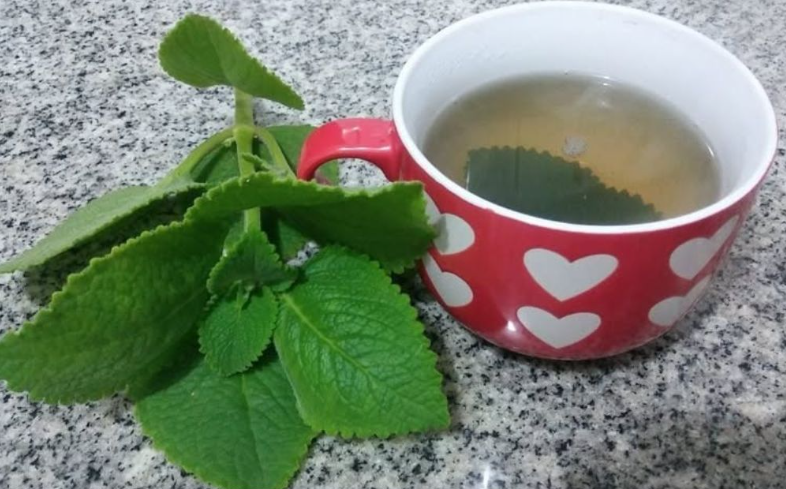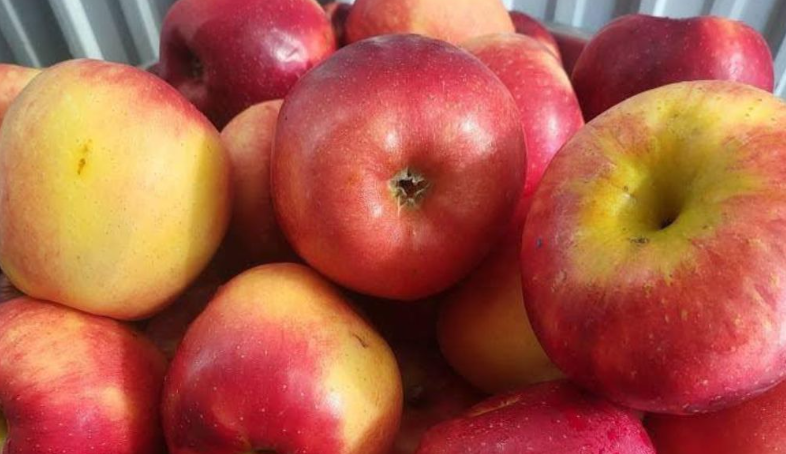My grandmother always handed me a single, weathered postcard on my birthdays. I’d sigh and roll my eyes, unimpressed.
I was 17 when she passed away. At 37, I returned to my childhood home and stumbled across a jar tucked away in the attic, holding 17 of her postcards.
I flipped one over and stopped cold.
These weren’t ordinary postcards—they were letters.
Not any letters, though. They were written in invisible ink.
When my thumb brushed the faded paper, words shimmered into view. I blinked, stared, my pulse quickening.
The first one began, “If you’re seeing this, you’re grown now. Maybe ready to know who I was.”
My hands trembled. Another line appeared as my fingers warmed the surface. “I saved these for you—not for birthdays, but for when life feels heavy and you need me close.”
I sank to the attic floor, knees tucked up, postcards spread around me like scattered memories.
I reached for another. Postmark: 1986. The year Grandpa walked out.
The card showed a field of wildflowers. As a kid, I’d thought it was dull. Now, it felt alive.
“I wept behind the shed after he left. You were a baby, gnawing on a spoon. I thought my world had collapsed. Then you crawled to me, offering your tiny, drool-soaked hand. I laughed, and something in me broke free. Life didn’t stop that day—it changed.”
I never knew she’d cried over Grandpa. I always saw her as unshakable, striding around in her worn boots, mending fences with one hand while stirring stew with the other.
I kept reading. Some cards were brief, like puzzles. Others cut deep.
The seventh postcard turned my world upside down.
It read, “Don’t trust Ramon.”
That was it.
Only those words: “Don’t trust Ramon.”
I hadn’t thought of that name in years. Ramon Garcia—the boy next door who became a handyman, then… something else. We’d grown up tossing pebbles at each other’s windows.
When I returned to town at 37, he was the one who fixed the creaky porch steps.
We’d shared coffee. He’d flirted. I’d smiled, thinking maybe—
No.
I set the card down and grabbed my phone.
I texted him: “Hey, can we catch up later? Found something odd.”
He replied instantly: “Sure, you okay?”
I wasn’t sure.
I kept reading.
Each postcard peeled back another layer of her life. She wrote about my dad—how his move to California shattered her. How she carried guilt for my mom’s struggles. How she stayed awake nights, fearing I’d resent her strict rules.
Postcard 13 was different, tucked in an envelope. A black-and-white photo of an ivy-draped chapel adorned the front.
I turned it over.
“There’s a lockbox under the floorboard in my sewing room. The code is the date we last made jam together.”
My eyes widened.
I remembered that day—aprons on, hands sticky with mashed strawberries, laughing until tears fell.
July 22, 1995.
I scrambled down the attic ladder.
The sewing room was mostly unchanged, just coated in dust. I knelt, tapping floorboards. The third one from the window sounded hollow.
I pried it up and found a rusty tin box.
Inside was a small safe with a keypad.
I entered: 072295.
It opened with a click.
Inside: stacks of cash, at least $30,000, bound tightly with rubber bands.
And a key.
Beneath it all, one last postcard.
No stamp. Only her handwriting.
“This money is for you. Not because you need it, but because you need to decide what it becomes. Let it grow. The key? You’ll know when it’s time.”
No further clues.
Only those words.
I sat on the floor, heart racing. I didn’t know whether to weep, laugh, or seal it all back up and walk away.
But I didn’t.
Instead, I returned to the attic and read every postcard again.
I arranged them like a map, a trail she’d left for me.
Days passed. Ramon’s name lingered in my mind. Her warning echoed.
I decided to test it.
I invited him for dinner.
We grilled chicken in the backyard, like old times. He brought wine, flashed that familiar smile. I almost let my guard down.
But midway through the evening, after laughter and a few sips, he grew quiet.
Then he asked, “So, you selling the house?”
I paused.
“Not sure,” I said. “Maybe I’ll fix it up.”
He nodded. “If you need help—wiring, pipes, or even finding a buyer—I know people.”
That’s when it hit me.
He wasn’t being kind. He was probing.
His eyes scanned the house, lingered on the property line, the old barn, the back acre Grandma never let anyone touch.
I smiled, but it felt forced.
After he left, I locked the doors and headed to the barn.
It hadn’t been opened in years. I yanked the light chain, dust swirling.
In the corner, under a tarp, was something metal.
A trunk.
I tried the key.
It worked.
Inside were journals, filled with Grandma’s handwriting.
But these weren’t about me.
They were about him.
“Ramon’s father came by in ‘97, asking for money for his son’s business. I refused. He threatened me. Said I’d regret it. Two weeks later, my truck’s brakes failed. I never told a soul. But I knew.”
Another entry:
“Ramon’s working with Eddie Mullins in town. They’re after the back land. Heard there’s lithium under it. I’m old, but I’m no fool. They’re waiting for me to slip.”
My stomach churned.
I remembered Eddie—ran the auto shop, always gave me an uneasy feeling.
I sat in the barn for an hour, reading every page. The back acre sat on valuable mineral rights. Grandma had kept it secret.
Now it made sense. Ramon wasn’t reconnecting. He was scheming.
The next morning, I called a lawyer.
By week’s end, I’d transferred the mineral rights to my name. I had the land appraised. It was worth far more than I’d imagined.
I didn’t breathe a word to Ramon.
Instead, I called my cousin Yasmeen in Austin, an environmental consultant. She connected me with a local, ethical clean energy firm eager to partner.
Suddenly, Grandma’s jar of postcards had become a beacon. A warning. A guide.
One evening, I brewed tea and reread the final card.
“Let it grow.”
Those words stayed with me.
I didn’t want the money or land to sit idle. So I used some of the cash to restore the house—nothing extravagant, just cozy and welcoming.
Then I launched a community project: Grandma’s Garden.
We planted wildflowers along the old field’s edge, added benches, and invited local schoolkids to paint stones and sow seeds.
People showed up. Neighbors I hadn’t seen in decades.
I shared stories about Grandma—not the stern woman they knew, but the one I met through her hidden letters.
Ramon? He tried contacting me again.
I didn’t respond.
A month later, I heard he’d tried buying land nearby. He was turned down.
Fate, maybe.
I still revisit those postcards.
Not out of sorrow, but because they remind me that people leave traces behind—messages, warnings, gifts.
Grandma knew I wouldn’t grasp her gifts as a child. But she gave them anyway.
She believed I’d understand one day.
And I did.
If you’re reading this and you’ve ever overlooked a gift someone gave you, take another look.
It might hold more than you think.
Thanks for reading. If this story touched you, share it. Someone else might need the reminder. 💌
